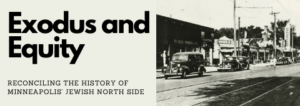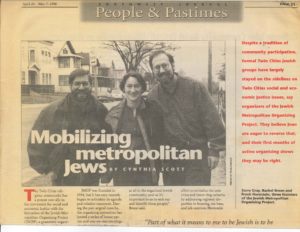This is part of Exodus and Equity: Reconciling the History of Minneapolis’ Jewish North Side, a series exploring how Twin Cities Jews were unwitting participants in racist real estate policies that shape today’s inequality in Minneapolis and other Midwestern American cities. In Minneapolis, that history is predominantly tied to two regions — Near North Minneapolis and St. Louis Park — and centered around civil unrest on Plymouth Avenue, in Near North, in the late 1960s.
——————————
While there has been much discussion about decriminalization post-George Floyd and housing issues equity during a health pandemic when unemployment is high, Jewish Community Action has been not only at the center of these discussions in the Jewish community — it has been there for years.
“At times like this, when there’s this mass mobilization of people and the Jewish community is looking for where it should be, JCA is often that conduit to bring what’s happening in the progressive movements to the broader Jewish community,” said Carin Mrotz, JCA’s executive director, “and then to be able to connect Jews to the work that’s happening in progressive space.”
 The 25-year-old organization has worked in close partnerships with local coalitions, interfaith initiatives, neighborhood groups, and minority and immigrant groups working for social and economic justice in the region. It is one of many Jewish organizing groups in the country and is one of the oldest — but still flies under the radar at times. But the work it has been doing is very much at the heart of many conversations that are taking place right now.
The 25-year-old organization has worked in close partnerships with local coalitions, interfaith initiatives, neighborhood groups, and minority and immigrant groups working for social and economic justice in the region. It is one of many Jewish organizing groups in the country and is one of the oldest — but still flies under the radar at times. But the work it has been doing is very much at the heart of many conversations that are taking place right now.
“It’s a paradox because there are, oftentimes, people nationally who say, ‘JCA is so huge,’ Mrotz said. “And then there are people locally who just don’t know that much about us. I think that’s part of being a communal organization.
“Similar to many organizations in the community, there will be times when we’re aligned, and then times when we’re not. So what’s important for JCA is that we stay in relationship in the community so that maybe perhaps on this issue, we’re not going to work together. But then when we’re working on anti-Semitism or affordable housing, we’re going to come back together.”
Being at the nexus of issues like the ones the community face is part of why the organization was started.

JCA Founders Steve Gray, Rachel Breen and Frank Hornstein in a Southwest Journal article in 1996.
“What we did initially, the organization still continues to do and continues to do well,” said State Rep. Frank Hornstein, who co-founded the organization with Rachel Breen. “And I think that one of our goals was to do two things: to fill a void in the Jewish community in terms of local social justice organizing, but there was another void that you didn’t see, which was there was no Jewish presence in these broader social justice community organizing coalitions.”
A Minneapolis native, Breen had worked in New York at the Jewish Fund For Justice, which eventually became Bend The Arc, before moving back to Minneapolis. Breen said that Hornstein had asked her about Chicago’s Jewish Council on Urban Affairs, and if that type of organization could work here.
“[Frank] and I just started kind of talking about what we saw as the need,” she said. “And I think both of us coming from organizer backgrounds, also just kind of thought that there was this absence of a Jewish presence on social and economic justice issues. And, as Jews committed to social and economic justice, we really saw that we could provide more.”
Vic Rosenthal, who was the first executive director of the organization and was on the steering committee that helped launch the group, said that JCA has always been in the middle of the most important issues confronting Minnesota.
“Whether it’s the aftermath of George Floyd, or tent cities, or the (anti-gay) marriage amendment or voter ID law, I always hoped that JCA would be in the middle representing the most progressive voices in the Jewish community,” he said.
Rosenthal said that part of the drive in the early years of JCA was getting involved in issues so critical to the broadest community that it was important for Jewish voices to be added.
“There were intractable issues in Minneapolis that had been there for so long, and there was a strong desire that the Jewish voice be an ally to communities most impacted,” he said.
Two of the larger campaigns that JCA is working on are decriminalizing communities and housing justice. Jacob Kraus-Preminger, who had been an organizer leading the decriminalizing communities campaign prior to leaving JCA, said that what feels different is that the things that have been a part of the organization’s ongoing work is continuing — there’s just more of it.
“Our mission is very focused on racial and economic justice and, at a time where communities are facing these dual crises of a pandemic, economic hardship, systemic racism, police violence, it’s in this spot where our mission sits,” he said. “We’re in, what we will call organizing parlance, a moment of escalation. Decriminalizing communities have talked about reimagining the criminal justice system for a couple of years. Now, we’re in a political moment where we’re doing more focused education and more focused conversations about what it looks like to re-envision community safety in Minneapolis.”
Dave Snyder, JCA’s organizing director, said that they have been having conversations with rabbis and the idea of reimagining public safety. While we won’t see them with synagogues having virtual High Holiday services, the Jewish community has become very used to seeing uniformed officers as security during services.
“We’re creating a space for congregant leaders to come together and be supported to wrestle with these issues of work of imagining public safety, beyond policing, thinking carefully and deeply about the critique of policing that’s coming up from the movement at this point, and bringing those conversations back to synagogues and Jewish communal institutions,” Snyder said. “And we are being really careful and intentional about that piece of work in particular, that it’s not about saying, ‘You have to take this position otherwise, we’re going to make you feel bad or we’re going to get into a fight.’ It’s about creating a space where people can wrestle with the issues and wrestle with the tension that they may feel and that Jewish communities feel about safety and security, even as we’re also holding the complexity of the challenge to systems of policing.”
Snyder said he knows that those conversations will look different depending on which congregations are involved.
“I’ve had conversations with rabbis, with dramatically different congregations in different spaces and more political diversity and they’ve been really interested and they’ve said ‘yes, congregants are coming to us and they want to have these conversations.’ We think we could be a good resource.”
Mrotz said that it’s not a unique conversation that Twin Cities shuls are having.
“It’s worth the work that other cities have done, it’s work that individual shuls have done,” she said. “If we’re going to continue to have armed police outside of our shuls that are going to put some folks in danger, then I think we owe it to our humanity to at least grapple with that.
“I think this is a conversation that for some in the community feels really hard, but that most of our community is actually ready to have.”
Kraus-Preminger points out that it hasn’t been all that long since Jewish communities — particularly those in Europe, were having these types of conversations regarding the safety of calling the police.
“I think there’s some really deep, ancestral wisdom and knowledge that we can get into as a community around these questions,” he said.
The housing justice campaign picked up a significant win on Aug. 17, when the St. Louis Park City Council unanimously voted to repeal the city’s crime-free/drug-free rental policy, which displaced hundreds of renters — the majority of whom had never been charged with a crime — from their homes. The law had a disparate impact on people of color, who are the majority of the renters in St. Louis Park.
Aaron Berc, the JCA organizer who leads the housing program, earlier in the pandemic shutdown led a training session on the Torah’s concept of forgiving rent — an especially timely discussion when it was held in late April and unemployment rates were skyrocketing.
But the issues of housing justice — like the racial work they are doing is work that dates back to the early days of JCA. Whatever role the Jewish community may have played as many left the Northside for the suburbs, Rosenthal said that many were glad to see the support of the Jewish community.
“When JCA started, there were a lot of big housing issues in North Minneapolis in the late 90s, and what I remember was several people in the African-American community pleased to see Jews return as allies and supporters of efforts to maintain and support affordable housing,” he said. “That was a big part of our work in the first few years.”
Rosenthal said that when the 2009 financial crisis hit, the northside was deeply affected and JCA had a role to play at that time. Snyder, whose first stint at JCA spanned 2005-12, was the housing organizer at that time and coordinated the organization’s response center.
“North [Minneapolis] was the most affected area and we believed we had a big role to play,” Rosenthal said.
In Snyder’s housing justice work, he has seen the convergence of the housing and policing issues.
“We’ve been really intentional at incorporating with each line of ongoing work, including our housing teams, in the suburbs, and in the cities, and thinking about the critique of policing and thinking about how we imagine public safety and policing,” Snyder said. “One of the members of this suburban team on this on our Zoom call said, ‘Well, isn’t this just a Minneapolis issue? The police here in this suburb are fine, aren’t they?’ Five seconds go by, and several of the other members of the team who lived in this suburb for like 40 years, ‘No, no, it’s also a problem here.’ It’s not the case that we can make the blanket statement that, you know, well, this is just a Minneapolis issue.”
JCA is simply building on some of the priorities that the Jewish community had in the early to mid-60s on civil rights and housing.
“Honestly, the JCA had to be created because many people felt there was a void,” Hornstein said. “The mid-90s were not the mid-60s in the Jewish community prioritization of this.”
Breen said that the fact that the Twin Cities has JCA, and that it has been leaned on by other communities to help launch similar organizations, is gratifying.
“We kind of recognized a need and desire,” she said. “The thing that I really keep coming back to is seeing how successful JCA has been in terms of organizing the Jewish community says to me that this was needed, and people wanted this kind of voice. We’ve tapped into this really strong need for this kind of collective voice and that’s been for me really gratifying.”


1 comment